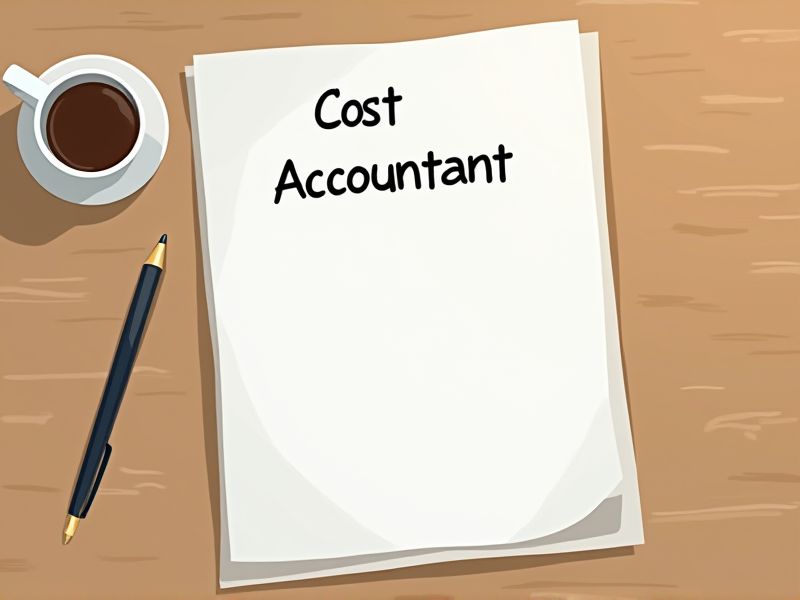
Cost accountants require specific certifications to validate their expertise in managing financial data and cost analysis. These certifications enhance their credibility and empower them with advanced skills to optimize cost efficiency in organizations. Employers often seek certified professionals to ensure compliance with industry standards and regulatory requirements. Important certifications for a cost accountant may include CPA, CMA, and CCA.
Certified Management Accountant (CMA)
The Certified Management Accountant (CMA) certification enhances a Cost Accountant's credibility and expertise in financial management and strategic decision-making. It provides specialized knowledge in areas like budgeting, performance management, and internal control, which are essential for effective cost analysis. Companies often prefer hiring CMAs for cost accounting roles due to their proven understanding of financial planning and analysis. The CMA certification opens up broader career opportunities and can lead to higher earning potential for cost accountants.
Certified Public Accountant (CPA)
A CPA offers expertise in financial compliance and auditing, ensuring cost accountants adhere to regulatory standards. Their knowledge in financial reporting enhances the accuracy and reliability of cost analysis performed by cost accountants. CPAs provide strategic insights leveraging extensive financial expertise, which helps guide cost-efficient decision-making. Their skill in identifying financial trends can improve cost management practices for better resource allocation.
Chartered Institute of Management Accountants (CIMA)
CIMA equips cost accountants with specialized skills in strategic management and business acumen, enhancing their ability to make informed financial decisions. The certification from CIMA is recognized globally, opening up opportunities for cost accountants in international markets. It provides a structured learning path that updates accountants on the latest industry practices and trends. As companies increasingly demand finance professionals with strategic insights, CIMA-certified cost accountants are positioned as valuable assets in driving organizational performance.
Certified Cost Accountant (CCA)
A Certified Cost Accountant (CCA) introduces standardized competency that enhances the reliability of financial assessments, ensuring accuracy in costing and budgeting. By holding a CCA designation, a cost accountant gains recognition of expertise, which can lead to career advancement and increased opportunities. This credential empowers accountants to apply advanced cost management techniques that drive strategic decision-making, optimizing resource allocation. Companies benefit from employing CCAs as they foster improved financial transparency and accountability, which can lead to better stakeholder trust.
Institute of Cost Accountants of India (ICMAI) Certification
The ICMAI certification ensures that cost accountants are equipped with standardized knowledge and skills, enhancing their ability to provide precise cost analysis. It opens up a wide range of job opportunities in finance and business sectors that seek certified professionals for accurate budgeting and financial planning. This certification also signifies a commitment to continuing professional development, keeping accountants updated with the latest industry practices and regulations. Companies often prefer or require ICMAI-certified cost accountants to ensure compliance with national and international financial reporting standards.
Certified Internal Auditor (CIA)
Cost accountants require CIA certification to ensure compliance with financial regulations, as this credential validates their expertise in identifying and mitigating risks within financial processes. The CIA certification enhances their analytical skills, leading to improved identification of potential cost-saving opportunities and optimization of resources. Organizations rely on cost accountants with this certification for improved credibility and trust in their internal financial reporting and controls. A CIA-certified professional can differentiate themselves in a competitive job market, potentially leading to better career advancement opportunities.
Six Sigma Green Belt Certification
Six Sigma Green Belt Certification equips cost accountants with enhanced process-improvement skills, leading to more efficient financial processes. By applying Six Sigma methodologies, cost accountants can identify and eliminate inefficiencies, contributing to cost savings. Proficiency in Six Sigma tools enables accountants to enhance accuracy in budgeting and forecasting. Organizations appreciate the certification because it signifies an accountant's ability to drive performance improvements.
Certified Financial Analyst (CFA)
A CFA credential enhances a cost accountant's ability to understand complex financial markets and investment strategies, which is crucial for informed budgeting and forecasting. The rigorous CFA curriculum deepens knowledge in areas like financial reporting, valuation, and quantitative methods, complementing a cost accountant's expertise in cost analysis and control. Employers often see CFAs as having a greater grasp of financial liquidity, risk management, and ethical standards, which can improve a cost accountant's decision-making skills. Holding a CFA can differentiate a cost accountant in competitive job markets, often leading to greater career opportunities and higher salary prospects.
Certificate in Management Accounting
A Certificate in Management Accounting equips a cost accountant with specialized skills in budgeting and financial analysis, enhancing their ability to manage an organization's resources effectively. This certification provides a deeper understanding of cost behavior and decision-making tools, which are critical for identifying cost-saving opportunities. It validates the accountant's proficiency in creating financial strategies that align with business objectives, increasing their value within the company. As businesses face complex financial regulations, a certified cost accountant is better positioned to ensure compliance and maintain robust financial health.
Project Management Professional (PMP)
Cost accountants benefit from PMP certification because it enhances their project management skills, allowing for better resource allocation and cost control. The structured methodology of PMP assists in accurately predicting project expenses, which improves budgeting processes. The certification provides a recognized standard of expertise that can increase credibility with stakeholders. Employers often prioritize candidates with PMP certification, which can lead to better career opportunities for cost accountants.
Summary
When you, as a cost accountant, obtain certifications, your career prospects can significantly improve due to increased credibility. Employers may perceive you as more valuable, often resulting in higher salary potential. The certifications can also enhance your skill set, allowing you to tackle complex financial challenges more effectively. Networking opportunities tend to expand, connecting you with industry leaders and peers.
